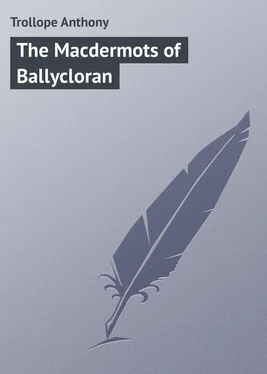Anthony Trollope - The Macdermots of Ballycloran
Здесь есть возможность читать онлайн «Anthony Trollope - The Macdermots of Ballycloran» — ознакомительный отрывок электронной книги совершенно бесплатно, а после прочтения отрывка купить полную версию. В некоторых случаях можно слушать аудио, скачать через торрент в формате fb2 и присутствует краткое содержание. Жанр: foreign_prose, на английском языке. Описание произведения, (предисловие) а так же отзывы посетителей доступны на портале библиотеки ЛибКат.
- Название:The Macdermots of Ballycloran
- Автор:
- Жанр:
- Год:неизвестен
- ISBN:нет данных
- Рейтинг книги:4 / 5. Голосов: 1
-
Избранное:Добавить в избранное
- Отзывы:
-
Ваша оценка:
- 80
- 1
- 2
- 3
- 4
- 5
The Macdermots of Ballycloran: краткое содержание, описание и аннотация
Предлагаем к чтению аннотацию, описание, краткое содержание или предисловие (зависит от того, что написал сам автор книги «The Macdermots of Ballycloran»). Если вы не нашли необходимую информацию о книге — напишите в комментариях, мы постараемся отыскать её.
The Macdermots of Ballycloran — читать онлайн ознакомительный отрывок
Ниже представлен текст книги, разбитый по страницам. Система сохранения места последней прочитанной страницы, позволяет с удобством читать онлайн бесплатно книгу «The Macdermots of Ballycloran», без необходимости каждый раз заново искать на чём Вы остановились. Поставьте закладку, и сможете в любой момент перейти на страницу, на которой закончили чтение.
Интервал:
Закладка:
And without saying anything further, Father John took his hat, and walked off. Feemy snatched her novel into her lap, to show how little what was said impressed her, and resumed her attitude over the fire. But she didn't read; her spirit was stubborn and wouldn't bend, but her reason and her conscience were touched by what the priest had said to her, and the bitter thought for the first time came over her, that her lover, perhaps, was not so true to her, as she to him. There she sat, sorrowfully musing; and though she did not repent of what she thought her own firmness, she was bitterly tormented by the doubts with which her brother, Mary Brady, and the priest, had gradually disturbed her happiness.
She loved Ussher as well as ever – yes, almost more than ever, as the idea that she might perhaps lose him came across her – but she began to be discontented with herself, and to think that she had not played her part as well as she might. In fact, she felt herself to be miserable, and, for the time, hated her brother and Father John for having made her so.
Father John walked sorrowfully back to his cottage, thinking Miss Feemy Macdermot the most stiff-necked young lady it had ever been his hard lot to meet.
CHAPTER IX
MOHILL
We must now request our reader to accompany us to the little town of Mohill; not that there is anything attractive in the place to repay him for the trouble of going there.
Mohill is a small country town, standing on no high road, nor on any thoroughfare from the metropolis; and therefore it owes to itself whatever importance it may possess – and, in truth, that is not much. It is, or, at any rate, was, at the time of which we are writing, the picture of an impoverished town – the property of a non-resident landlord – destitute of anything to give it interest or prosperity – without business, without trade, and without society. The idea that would strike one on entering it was chiefly this: "Why was it a town at all? – why were there, on that spot, so many houses congregated, called Mohill? – what was the inducement to people to come and live there? – Why didn't they go to Longford, to Cavan, to Carrick, to Dublin, – anywhere rather than there, when they were going to settle themselves?" This is a question which proposes itself at the sight of many Irish towns; they look so poor, so destitute of advantage, so unfriended. Mohill is by no means the only town in the west of Ireland, that strikes one as being there without a cause.
It is built on the side of a steep hill, and one part of the town seems constantly threatening the destruction of the other. Every now and again, down each side of the hill, there is a slated house, but they are few and far between; and the long spaces intervening are filled with the most miserable descriptions of cabins – hovels without chimneys, windows, door, or signs of humanity, except the children playing on the collected filth in front of them. The very scraughs of which the roofs are composed are germinating afresh, and, sickly green with a new growth, look more like the tops of long-neglected dungheaps, than the only protection over Christian beings from the winds of heaven.
Look at that mud hovel on the left, which seems as if it had thrust itself between its neighbours, so narrow is its front! The doorway, all insufficient as it is, takes nearly the whole facing to the street. The roof, looking as if it were only the dirty eaves hanging from its more aspiring neighbour on the right, supports itself against the cabin on the left, about three feet above the ground. Can that be the habitation of any of the human race? Few but such as those whose lot has fallen on such barren places would venture in; but for a moment let us see what is there.
But the dark misery within hides itself in thick obscurity. The unaccustomed eye is at first unable to distinguish any object, and only feels the painful effect of the confined smoke; but when, at length, a faint, struggling light makes its way through the entrance, how wretched is all around!
A sickly woman, the entangled nature of whose insufficient garments would defy description, is sitting on a low stool before the fire, suckling a miserably dirty infant; a boy, whose only covering is a tattered shirt, is putting fresh, but, alas, damp turf beneath the pot in which are put to boil the potatoes – their only food. Two or three dim children – their number is lost in their obscurity – are cowering round the dull, dark fire, atop of one another; and on a miserable pallet beyond – a few rotten boards, propped upon equally infirm supports, and covered over with only one thin black quilt – is sitting the master of the mansion; his grizzly, unshorn beard, his lantern jaws and shaggy hair, are such as his home and family would lead one to expect. And now you have counted all that this man possesses; other furniture has he none – neither table nor chair, except that low stool on which his wife is sitting. Squatting on the ground – from off the ground, like pigs, only much more poorly fed – his children eat the scanty earnings of his continual labour.
And yet for this abode the man pays rent.
The miserable appearance of Irish peasants, when in the very lowest poverty, strikes one more forcibly in the towns than in the open country. The dirt and filth around them seems so much more oppressive on them; they have no escape from it. There is much also in ideas and associations. On a road-side, or on the borders of a bog, the dusty colour of the cabin walls, the potato patch around it, the green scraughs or damp brown straw which form its roof, all the appurtenances, in fact, of the cabin, seem suited to the things around it. But in a town this is not so. It evidently should not be there – its squalidness and filth are all that strike you. Poverty, to be picturesque, should be rural. Suburban misery is as hideous as it is pitiable.
Again, see that big house, with such pretensions to comfort, and even elegance, – with its neat slated roof, brass knocker on the door, verandahs to the large sashed windows, and iron railing before the front. Its very grandeur is much more striking, that from each gable-end hangs another cabin, the same as those we have above described. It is true that an entrance for horses, cars, and carriages has been constructed, as it were through one end of the house itself; otherwise the mansion is but one house in the continuous street.
Here lives Mr. Cassidy, the agent; a fat, good-natured, easy man, with an active grown up son. Every one says that Mr. Cassidy is a good man, as good to the poor as he can be. But he is not the landlord, he is only the agent. What can he do more than he does? Is the landlord then so hard a man? so regardless of those who depend on him in all their wants and miseries? No, indeed; Lord Birmingham is also a kind, good man, a most charitable man! Look at his name on all the lists of gifts for unfortunates of every description. Is he not the presiding genius of the company for relieving the Poles? a vice-presiding genius for relieving destitute authors, destitute actors, destitute clergymen's widows, destitute half-pay officers' widows? Is he not patron of the Mendicity Society, patron of the Lying-in, Small Pox, Lock, and Fever Hospitals? Is his name not down for large amounts in aid of funds of every description for lessening human wants and pangs? How conspicuous and eager a part too he took in giving the poor Blacks their liberty! was not his aid strongly and gratefully felt by the friends of Catholic emancipation? In short, is not every one aware that Lord Birmingham has spent a long and brilliant life in acts of public and private philanthropy? 'Tis true he lives in England, was rarely in his life in Ireland, never in Mohill. Could he be blamed for this? Could he live in two countries at once? or would the world have been benefited had he left the Parliament and the Cabinet, to whitewash Irish cabins, and assist in the distribution of meal?
Читать дальшеИнтервал:
Закладка:
Похожие книги на «The Macdermots of Ballycloran»
Представляем Вашему вниманию похожие книги на «The Macdermots of Ballycloran» списком для выбора. Мы отобрали схожую по названию и смыслу литературу в надежде предоставить читателям больше вариантов отыскать новые, интересные, ещё непрочитанные произведения.
Обсуждение, отзывы о книге «The Macdermots of Ballycloran» и просто собственные мнения читателей. Оставьте ваши комментарии, напишите, что Вы думаете о произведении, его смысле или главных героях. Укажите что конкретно понравилось, а что нет, и почему Вы так считаете.












